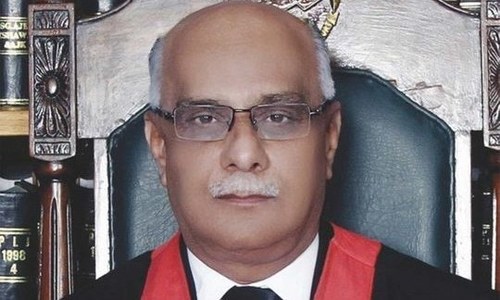PESHAWAR: The Peshawar High Court on Thursday sought records of the proceedings of the parliamentary committee on the judges’ appointment regarding the non-confirmation of three judicial officers for elevation as additional judges of the high court.
A bench consisting of Justice Lal Jan Khattak and Justice Musarrat Hilali fixed Feb 17 for the next hearing into two identical petitions filed by three district and sessions judges challenging the decision of the parliamentary committee against confirming the recommendations of the Judicial Commission of Pakistan (JCP) for the judges’ appointment.
One of the petitions was jointly filed by judges Fazal Subhan and Shahid Khan and the other by Dr Khurshid Iqbal.
The petitioners prayed the high court to declare unconstitutional, illegal and without lawful authority the impugned decision of the parliamentary committee of not confirming the JCP-recommended names, and set it aside.
Petitions challenge non-confirmation of judicial officers for elevation to PHC
They requested the court to declare that all six names nominated by the JCP for appointment as additional judges of the Peshawar High Court should be deemed to have been confirmed under Article 175-A (12) of the Constitution and the parliamentary committee was bound to send all the six names to the Prime Minister who should forward the same to the President of Pakistan for appointment.
The petitioners further requested the court to direct the parliamentary committee to send the names of the petitioners recommended by the JCP to the Prime Minister for forwarding it to the country’s president in accordance with Article 175-A(13) of the Constitution for their appointment as additional judges.
They have also sought interim relief from the court requesting to suspend the impugned decision of the parliamentary committee till the final disposal of these petitions.
The bench also issued notices to the parliamentary committee and the federal government through the law secretary asking them to respond to the interim relief plea of the petitioners.
Senior lawyers Abdul Lateef Afridi, Syed Mudasser Ameer, Adnan Khan and Yaseen Raza Khan appeared for the petitioners.
They said six vacancies of judges existed in the high court for which the chief justice, after consulting other judges and scrutinising the credentials of numerous candidates, recommended the names of the three petitioners and three lawyers, including Kamran Hayat Miankhel, Mohammad Ijaz Khan and Mohammad Faheem Wali, for appointment as additional judges for a period of one year.
The counsel said the JCP in its meeting on Jan 5, 2022, re-examined the said nominations and after a threadbare discussion recommended the said six names including that of the three petitioners, with the majority of 10 to 2 with one member abstaining for appointment as additional judges.
They contended that on Jan 19, the news and social media platforms reported that the parliamentary committee did not confirm the appointment of the three judicial officers in light of the ‘principle of seniority’ and that their names were sent back to the JCP for reconsideration.
According to the news, the lawyers said, names of the rest of the three recommended people were confirmed by the parliamentary committee and sent to the prime minister for forwarding the same to the president for appointment as additional judges under Article 175A(13) of the Constitution.
The counsel said their clients had applied to the parliamentary committee for a copy of the minutes of the meeting held in this regard, but the same was refused on the pretext that the proceedings being ‘in camera’ no copy thereof can be provided.
They added that acting upon the decision of the parliamentary committee, the federal government had not sent the names of the petitioners to the president for issuance of notification of their appointment.
The lawyers argued that by examining or entering into the issue of seniority cum fitness or competence of the judicial officers, the parliamentary committee had exceeded its authority and jurisdiction vested in it by the Constitution.
They contended that according to the news reports, the very same day when the parliamentary committee didn’t approve the names of the petitioners purely on the basis of seniority, it had approved and recommended the name of Justice Ayesha Malik for appointment to the Supreme Court in utter violation of the seniority principle.
The counsel argued that it had already been settled through repeated judgments of the superior courts that the parliamentary committee could not reverse, veto, or review the decision of the JCP with regards to the appointment of the judges to the high court and any such action taken would be illegal.
Published in Dawn, February 4th, 2022













































Dear visitor, the comments section is undergoing an overhaul and will return soon.